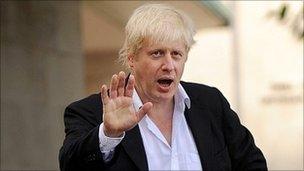Boris Johnson tries to blunt the cutters
- Published
Boris Johnson has announced that he will stand in 2012 for a second term as Mayor of London. But, with government cuts hitting Londoners' by then, will he have to take on his Tory colleagues at Westminster?

Boris Johnson says he will stand up for London
"Boris, Boris, Boris," chanted the audience as Mayor Boris Johnson officially signed on to lead London in 2008.
The Tories were riding high - Gordon Brown's premiership was beset by problems, while David Cameron's ratings were soaring.
But Mr Johnson's election campaign in 2012 is unlikely to take place in similarly favourable conditions.
By then, the coalition's austerity measures will be squeezing the pockets of millions and voters may not be so enamoured of the Tories.
"Without doubt it's going to be a difficult time because a lot of people will be lining up behind the deficit-deniers in the Labour Party, saying we don't need to take any action, when obviously action does need to be taken," Andrew Boff, a Conservative London Assembly member, said.
"Every single government gets a mid-term kickback from the electorate who want to say they're not happy about particular things."
'Not a tigress'
Cycling next to me on a Sunday ride in central London, Mr Johnson praised the "pulsing ecstasy" of a jaunt on a bike through the city.
But high-profile campaigns espousing the benefits of two-wheeled transport are not going to be enough to assuage voters.
Instead, those around the mayor believe salvation lies in taking on the coalition government over cuts, and Mr Johnson has a long list of spending he wants to protect.
"If you look at what's happening to the proposal to cap housing benefit, that will have a disproportionate impact on London," Mr Johnson told me.
"I'm anxious about what's happening with the schools budget.
"You're asking me like a tigress to single out some of her cubs for special protection. I won't. I'm going to fight for all these things."
'No bad thing'
The danger of this strategy is it risks a very public split with Mr Cameron.
Jonathan Isaby, the author of How Boris Won London, is convinced that is precisely what Mr Johnson wants.
"From Boris's perspective, I think the idea of Boris-Cameron rows being written up is probably no bad thing," he said.
"He wants to show that he's standing up for the capital, and standing up to the government in London's interest."
It is in effect what might be termed "the semi-detached strategy" - a deliberate attempt by Mr Johnson to put some distance between himself and the prime minster.
It is also an attempt to present a much more liberal form of Conservatism to that embodied by the party nationally.
"Boris has talked about an amnesty on immigration; it's not something the coalition has wanted to champion so there's an obvious difference," Steve Norris, a former Tory candidate for mayor, said.
"Clearly Boris will be talking about investment in London infrastructure, which he can very well argue is still not sufficiently well-financed.
"There are plenty of areas where he can distinguish the record of London from the national record."
'Eyeball to eyeball'
Nowhere is the clash with the Cameron government likely to appear more bruising than over the £16bn Crossrail project, which will connect the City, West End and Heathrow to areas east and west of the capital.
One aide suggested it would be "an eyeball-to-eyeball" confrontation but, despite the public posturing, Mr Johnson appears to have won already.
Tory MP Stephen Hammond, who is the prime minister's link man on London, said the coalition government clearly wanted Mr Johnson to win, and to win well.
"I think there are a number of things where the national government is going to assist - the commitment to Crossrail and the commitment to making sure Boris will be able to make sure there is enough finance available to make sure the Tube upgrades happen," he said.
So, with the cost of Crossrail apparently outweighed by the cost of losing London, in some ways the clash with Mr Cameron will be a phoney war.
But even so, it is a clash that Mr Johnson - with his eyes perhaps still one day on succeeding Mr Cameron - appears to be looking forward to.
"I'm already accused of showing excessive independence from the Conservative coalition but my job is to stand up for London - that's what I'm going to do," he said.
- Published15 July 2010
- Published18 June 2010